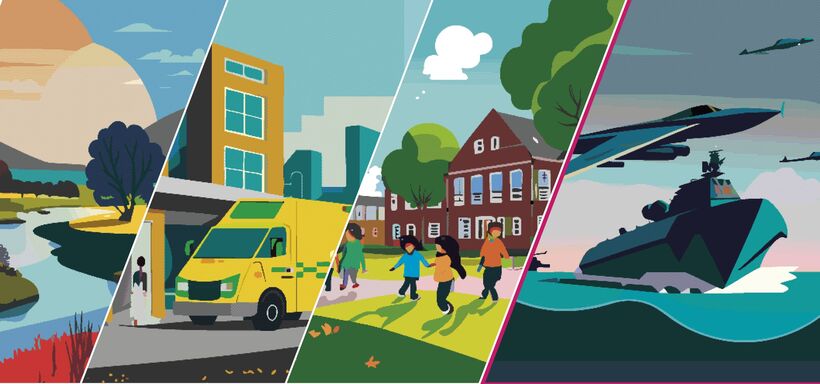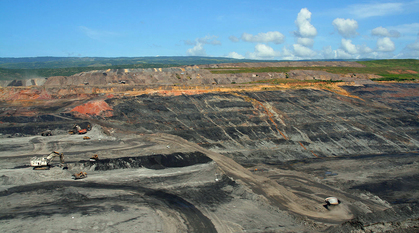6 ways our new government could build a peaceful and sustainable world
Anna Lewis and Dixe Wills shine a light on Quaker hopes for our new government.

Now that the UK has a new government, many will be watching to see how Labour's campaign translates into reality. We'll be hoping, of course, that it will result in positive changes for two topics that perhaps were not as prominent in the election campaign as we would have liked: climate justice and peace.
The conflicts in Ukraine and Gaza have been high on the UK news agenda, and polls suggest most UK voters are now concerned about the intensifying threat of climate breakdown. But something that was barely touched on during the election campaign is the myriad links between the two.
When we look for what is behind both climate breakdown and violent conflicts, we see a dominant economic system that is driven by profit, growth and extraction. This system depends on war and militarism for its own survival, but these violent tactics bring death and destruction, consume vast amounts of public resources and break down states' ability to cooperate to solve our shared problems.
So what actions can our new government take to help bring about a more peaceful and sustainable world? We've identified six key steps:
1. Work towards a just and sustainable peace
The UK government must use diplomacy and promote peaceful responses to global conflict including in in Ukraine and Gaza. This means valuing the security needs of all people across those regions and ensuring accountability for violations of international law.
Quakers have welcomed the recent decision to restore funding to the United Nations Relief and Works Agency for Palestine (UNRWA). However, there is still an urgent need to suspend arms licences to Israel. It is also vital that the UK upholds and respects the decisions of international courts, including the recent findings and orders of the International Court of Justice.
In the longer term, we need the UK to take a 'human security' approach. This means working with others to build the foundations of a safer world by addressing the causes of insecurity, rather than focussing on competition or military strength. The recently announced Strategic Defence Review provides an opportunity to do this. The review should be conducted in an open and inclusive way that values all perspectives, not just those of traditional security policymakers.
2. Redirect military spending to build a safer world
Climate breakdown is one of the biggest barriers to a world in which everyone can be safe and flourish. It can only be tackled with international cooperation and with investment in funding a just transition to a low carbon economy in the UK. Despite this, Labour's security agenda has focused on ramping up militarisation. They aim to spend 2.5% of GDP on the military, and declared an 'unshakeable commitment' to the UK's expensive and immoral nuclear weapons programme. This government needs a plan to redirect money currently spent on weapons and the military – which only fuel further climate breakdown – to help build the foundations for a safer world.
3. Phase out fossil fuels
We welcome Labour's commitment not to issue new licences for oil and gas production and coal mining in the UK. However, the government must also stop using public funds to subsidise the companies that are polluting our climate. Our new government could ensure that fossil fuel subsidies are redirected to action on climate. And it could endorse a global plan to bring about a fast, fair end to the era of coal, oil and gas through a Fossil Fuel Non-Proliferation Treaty. These steps would send a strong signal to other countries and to the companies that financially enable new fossil fuel projects that it's time to get serious about phasing out fossil fuels.
4. Invest in a just transition
Justice must be at the heart of our transition to a sustainable economy. The current system can't continue, where the poorest suffer while the rich get richer. Labour has centred economic growth in their missions for the next 5 years. But their financial commitment to a clean energy transition falls short of the scale needed – the National Infrastructure Commission estimates £30 billion per year is needed until 2040. In 2021, Rachel Reeves pledged to be Britain's first “Green Chancellor"; it's time to put this into practice. Ambitious action to tackle the climate crisis now will cost less than delaying.
5. Raise finance to address climate-induced Loss and Damage
The costs of the climate crisis are not just a matter for the future. Climate breakdown has been impacting vulnerable communities worldwide for decades. They urgently need support to recover so that one crisis doesn't keep leading to another. In 2022, 198 countries, including the UK, agreed to set up an international 'Loss and Damage Fund' to provide this support. However, the funds committed so far are a fraction of what is needed. This government must outline how it will raise new and additional funds, through actions such as redirecting fossil fuel subsidies, redirecting military spending and making big polluters pay.
6. Support peace education
In our work with schools, we're seeing a desire from teachers and students to engage with themes like climate justice and armed conflict, as well as peacebuilding in their own communities. Educators need support and a mandate. Government has a duty to help create a culture of peace and nonviolence locally and globally, in line with Sustainable Development Goal 4.7. This includes explicitly recognising a duty to educate for peace, and providing funding for peace education, training and research. More information can be found in our report, Peace at the heart.
But of course we're not simply going to sit back, cross our fingers, and hope the government carries these actions out. Quakers in Britain will be raising these concerns with the government through various channels. However, it will strengthen our case if members of parliament from all parties hear from Friends about what steps Quakers would like the government to take. For help and advice in contacting your local MP or planning an action, visit our political engagement page.


